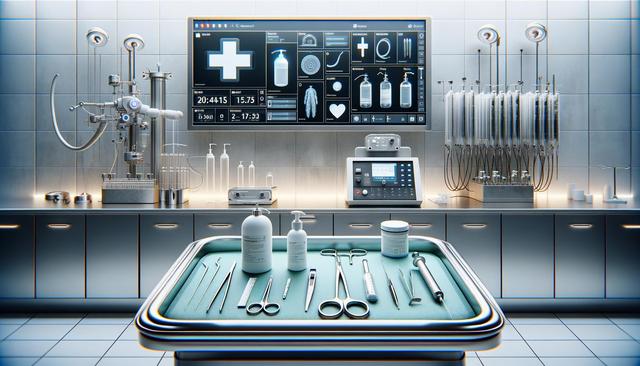
Exploring the Path to a Career in Sterile Processing
Understanding the Role of Sterile Processing Technicians
Sterile processing technicians are essential members of any healthcare team, ensuring that surgical instruments and medical equipment are properly cleaned, sterilized, and maintained. Their work directly impacts patient safety by reducing the risk of infection and ensuring that medical tools function as intended. This behind-the-scenes role requires a high level of attention to detail, a strong sense of responsibility, and specialized training that can be obtained through various sterile processing technician programs. The growing demand for skilled technicians has made this a viable and respected career path for individuals interested in healthcare support roles.
Technicians in this field typically work in hospitals, outpatient care centers, and surgical facilities. Their duties include decontaminating surgical tools, assembling instrument trays, operating sterilization equipment, and maintaining accurate records. These responsibilities require a solid foundation in sterilization protocols, infection control, and equipment handling, all of which are covered in a comprehensive sterile processing training program.
Exploring Sterile Processing Training Options
For those wondering how to become a sterile processing technician, the journey typically begins with enrolling in a formal training program. These programs are designed to equip students with the knowledge and hands-on experience necessary to perform the job effectively. Options include in-person classes, hybrid formats, and online sterile processing training, allowing students to choose a path that fits their lifestyle and schedule.
Many community colleges and vocational schools offer sterile processing technician programs, with course content covering subjects such as microbiology, infection prevention, sterilization techniques, and medical terminology. When searching for accessible education, prospective students might look up a “central sterile technician course near me” to find local opportunities. Online options can also be a practical choice, particularly for those balancing work or family commitments. These programs make it possible to gain a solid foundation in sterile processing without needing to attend campus-based classes.
What to Expect in a Sterile Processing Training Program
A sterile processing training program typically includes both theoretical instruction and practical experience. The curriculum usually spans several months and may culminate in a certification exam. A well-rounded program will ensure that students are prepared for real-world challenges by offering training in the following areas:
- Principles of sterilization and decontamination
- Healthcare safety standards and compliance
- Instrument identification and handling
- Use of autoclaves and other sterilization equipment
- Inventory and storage management
Many programs also incorporate clinical externships or internships, allowing students to gain hands-on experience in a healthcare setting. This practical component is crucial for building confidence and competence, and it often serves as a stepping stone to employment opportunities after graduation.
Finding the Right Program for Your Career Path
Choosing the right training program is a key step in entering the sterile processing field. When evaluating programs, consider factors such as accreditation, faculty experience, curriculum content, and graduate support services. It’s also important to look at job placement rates and employer partnerships, which can significantly impact your career trajectory after completing the program.
Those seeking local options can search for a “central sterile technician course near me” to find nearby institutions. Alternatively, online sterile processing training programs offer flexibility and accessibility, especially for individuals in rural areas or with demanding schedules. Regardless of the format, a quality training program should prepare students to sit for a nationally recognized certification exam, which is often required by employers and can enhance job prospects.
Additional considerations when choosing a program may include:
- Availability of financial aid or payment plans
- Student reviews and testimonials
- Support for exam preparation
- Continuing education opportunities
Career Outlook and Advancement Opportunities
The demand for sterile processing technicians is steady, driven by the ongoing need for safe surgical procedures and infection control in healthcare facilities. Completing a sterile processing training program opens the door to entry-level positions, but the career path offers room for growth. With experience and additional certifications, technicians can advance to supervisory roles, become educators, or transition into related areas such as surgical technology or infection control.
Some professionals choose to specialize in certain types of equipment or procedures, while others may pursue leadership positions within central sterile departments. Continuous learning is encouraged in this field, and many employers support further training to enhance staff skills and maintain high standards of care. For those with long-term goals in healthcare, sterile processing can serve as a foundation for broader career development.
Whether you’re just beginning to explore how to become a sterile processing technician or are actively comparing sterile processing technician programs, understanding the full scope of the profession and its opportunities is essential for making informed decisions about your future.
Conclusion: Taking the First Step Toward a Vital Healthcare Career
Pursuing a career in sterile processing offers a meaningful way to contribute to patient safety and healthcare operations. With the right education, including options such as a local “central sterile technician course near me” or an accessible online sterile processing training program, individuals can prepare for a stable and rewarding role in the medical field. A quality sterile processing training program serves as the foundation for both entry-level employment and long-term career growth. For those drawn to healthcare and committed to maintaining high standards of hygiene and safety, this path provides a solid and respected professional opportunity.


